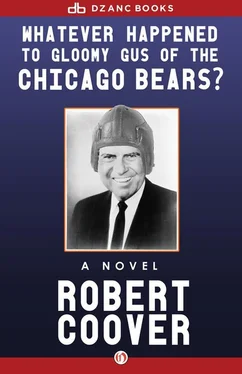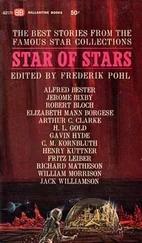Robert Coover - Whatever Happened to Gloomy Gus of the Chicago Bears?
Здесь есть возможность читать онлайн «Robert Coover - Whatever Happened to Gloomy Gus of the Chicago Bears?» весь текст электронной книги совершенно бесплатно (целиком полную версию без сокращений). В некоторых случаях можно слушать аудио, скачать через торрент в формате fb2 и присутствует краткое содержание. Год выпуска: 2014, Издательство: Dzanc Books, Жанр: Современная проза, на английском языке. Описание произведения, (предисловие) а так же отзывы посетителей доступны на портале библиотеки ЛибКат.
- Название:Whatever Happened to Gloomy Gus of the Chicago Bears?
- Автор:
- Издательство:Dzanc Books
- Жанр:
- Год:2014
- ISBN:нет данных
- Рейтинг книги:4 / 5. Голосов: 1
-
Избранное:Добавить в избранное
- Отзывы:
-
Ваша оценка:
- 80
- 1
- 2
- 3
- 4
- 5
Whatever Happened to Gloomy Gus of the Chicago Bears?: краткое содержание, описание и аннотация
Предлагаем к чтению аннотацию, описание, краткое содержание или предисловие (зависит от того, что написал сам автор книги «Whatever Happened to Gloomy Gus of the Chicago Bears?»). Если вы не нашли необходимую информацию о книге — напишите в комментариях, мы постараемся отыскать её.
Whatever Happened to Gloomy Gus of the Chicago Bears? — читать онлайн бесплатно полную книгу (весь текст) целиком
Ниже представлен текст книги, разбитый по страницам. Система сохранения места последней прочитанной страницы, позволяет с удобством читать онлайн бесплатно книгу «Whatever Happened to Gloomy Gus of the Chicago Bears?», без необходимости каждый раз заново искать на чём Вы остановились. Поставьте закладку, и сможете в любой момент перейти на страницу, на которой закончили чтение.
Интервал:
Закладка:
She pulled back in surprise, as though to ask: You, too, Meyer? I realized it wasn’t the right time to have asked her. “Meyer, you know I can’t… I don’t do that sort of thing…”
“No, I mean just your eyes, I want to try to do your eyes.”
She stared at me a moment, her face still taut and damp with tears. Then she relaxed, took a sip of the coffee, wincing a bit, and smiled gently with cracked, swollen lips. “You’re a funny boy, Meyer,” she said.
On my way to Polly’s Fishmarket on North Avenue, I pass a movie theater with a poster advertising a Coming Attraction: The Last Train from Madrid , starring Dorothy Lamour. “A hair-raising experience,” it says. “The first motion picture based on the Spanish War … Takes no sides.” Instant entertainment from the world’s atrocities, “WAR IS SWELL… when a hero can succeed in winning the love of a lady like Dorothy Lamour, says Gilbert Roland.” So much for heroism, for the struggle against oppression and injustice, laying down one’s life for his fellow men. Of course, not so instant: given the lag time in motion-picture production, “quick-thinking, fast-acting Paramount Pictures” must have started shooting before Franco did. And as for entertainment, who am I to cast stones? My Jarama flowers, fallen warriors, poised athletes, even my Gorky mask: how much is really a gift to the world, how much a premeditated theft of its substance?
“Hey, whadda udder fella look like, Mayor?” Polly asks with an appreciative whistle.
“I hit a door, Polly.”
“Sure, sure, lucky da door don’ shoot you! I hope she wort’ it! Hey, you should see da mullets, Mayor, you wooden believe!”
“Not today, Polly. Just a bit of mackerel, please. And a couple fishheads for my cat, if you have any.”
“Sure, I got fishhead,” he says, dipping into the sink. He slaps one on the drainboard, flops a red mullet out between us. “Jus’ looka dat, Mayor! Ain’ he gorgiss?”
“It looks delicious, Polly. Maybe tomorrow.”
“Tomorra Friday, wop fishday, all gone. Nowza time, Mayor! Firs’ udda munt’, you got money inna pocket! Enjoy!”
The fishhead has somehow slithered back into the sink. “Well, okay. But a smaller one.” He doesn’t hear my qualification, starts wrapping up the mullet he’s shown me. “For you, chip,” he assures me. Oh well. For the Baron’s sake, I rationalize, reaching for the bill crumpled up under the railroad spikes in my pocket. Polly dips for another generous handful of heads and other slippery debris. Jesse won’t mind. We’ll share it with Harry and Ilya if they come along. My friends often let me do their fish-buying for them so I can establish credit for the Baron. For all of us actually: the Baron’s often had to share his windfalls with the rest of us during hard times in the form of stew or, when Golda lends a hand, fishcakes.
“You wan’ some ice crim, Mayor? My sister make.”
“Next time, Polly,” I say firmly, snatching up the parcels before the fish can slip into the sink again.
He shrugs, surrenders the change. “Take care da eye, Mayor — an’ stay way marrit leddies! Drive you wreck an’ ruin!”
This was more or less that Hearst reporter’s theory about “whatever happened” to Gloomy Gus: a great athlete unmanned by a fatal weakness for women. The Samson syndrome. “That sumbitch couldn’t get enough, M’ar,” he told me, sitting back against my cold stove, his voice soft with awe and envy. He was staring at my iron bed (we’d just exchanged a few anecdotes, mentioning no names), shaking his head. “He was a goddamn legend. His dingdong was like the community relay baton, he poked it in every pussy in this fuckin’ country, from kid movie stars to the President’s grandmaw, he hardly had time for anything else. Finally, the way I figure it, all that humpin’ just shook his marbles loose.” There was a grain of truth in this. Or perhaps I should say, a seed of truth. The full title of that song about him was “You Gotta Be a Football Hero, To Get Along with the Beautiful Girls,” and sometimes that did seem to be the point of it. His sexual exploits were truly notorious, as famous as his touchdowns, really, and he’s still the subject of a lot of jokes — only Friday I heard one down at Sam’s Place near the Republic Steel mills, the one about Gloomy Gus losing a bet that he could screw all forty-six of the Radio City Rockettes in one night, giving up in defeat finally at forty-three (“Twenty-nine, more like,” Leo interrupted with a wink at me) with the apology that he couldn’t understand what was wrong, the rehearsal that afternoon had gone just fine. But that joke had more truth in it than the Hearst reporter’s theory, even down to the sterile mechanized sex of the Rockettes. For it wasn’t really dissipation that brought down Gloomy Gus. Simon maybe was closer to it with what he calls “the inherent contradictions of the American dream,” though it seems likely to me any dream of order would do.
Telling jokes in Sam’s Place was the quiet part about Friday. Mostly it was hard work and finally not a little dangerous, my own most obvious souvenir of the day being my tenderized eye. I’d like to say the eye was a consequence of the sterile mechanized anality of the Chicago police force, their familiar and libidinous choreography of swinging saps and truncheons, but it wasn’t as simple as that. Leo had personally asked me to come down: the place was full of strangers, one of the drawbacks of the movement’s new fluidity and national solidarity, and Leo was sure several of them were company spies. “Now that I’ve lost Jesse, Meyer, I need someone near me I can trust.” It was Friday, the day I always relinquished my studio to Golda and Gus, so I needed some place to go anyway. I’ve never been that far south in Chicago before — nearly 120 blocks below the Loop — and I was surprised at how much open space there was. Even the steel plant is built low to the ground down there, sprawling about loosely to the south over some three hundred gritty acres between the Calumet River and the Pennsy Railroad tracks. The CIO organizers had set up their headquarters in a friendly working-class tavern called Sam’s Place, situated at the northeast edge of a grassy field looking across at the front gates of the Republic mill. In fact there’s a well-worn beeline path diagonally across the field from the gates to Sam’s Place, no doubt laid there by Sam’s regulars. No beer at Sam’s Friday, though, only water. There were a few ice-cream and soft-drink vendors around, a lot of picnic food, and some did have their own bottles, but there wasn’t all that much drinking going on. A policy of the union organizers, of course, but it was anyway too hot for alcohol. Hot and sunny. The field between us and the plant seemed almost to glow in the blazing light, and I thought at the time: It’s a stage, waiting there for us, almost magical in its alluring power. For the present we are all hovering in the wings, but who on either side will be able to resist its shimmering pull?
There were many that seemed unable to resist it that afternoon, and Leo was worried about them. He and the rest of the organizers tried to distract them with softball games, pamphleteering, speeches, safety and marching drills, first-aid training, idle legwork, but it was very hot and people were impatient. A lot of them distrusted the organizers, resented being manipulated in any way. Others thought the organizers were moving too slowly for reasons they couldn’t understand. They wanted to get this over with and get back to work. Why wait for Girdler to bring in reinforcements? This waiting was no good. Only action would change anything. Why not at least march across to the plant, get close enough to reach the men still inside with loudspeakers, shame the honest ones into coming out? Not even the organizing committee was in complete agreement about strategy, torn between the reluctant voices and the rash. But a Memorial Day picnic had been called for Sunday when other workers and their families could turn up, a wooden stage was being built, folksingers and speakers had been scheduled, Gloomy Gus included, there was a newsreel guy expected from Paramount Pictures; it made no sense to rush things, not to Leo anyway, so he used me most of the day scouting out hotheads and helping him cool them down.
Читать дальшеИнтервал:
Закладка:
Похожие книги на «Whatever Happened to Gloomy Gus of the Chicago Bears?»
Представляем Вашему вниманию похожие книги на «Whatever Happened to Gloomy Gus of the Chicago Bears?» списком для выбора. Мы отобрали схожую по названию и смыслу литературу в надежде предоставить читателям больше вариантов отыскать новые, интересные, ещё непрочитанные произведения.
Обсуждение, отзывы о книге «Whatever Happened to Gloomy Gus of the Chicago Bears?» и просто собственные мнения читателей. Оставьте ваши комментарии, напишите, что Вы думаете о произведении, его смысле или главных героях. Укажите что конкретно понравилось, а что нет, и почему Вы так считаете.












